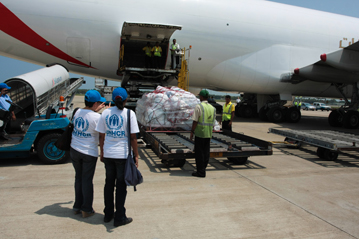Fresh fighting drives new surge of Liberians into Côte d'Ivoire
Fresh fighting drives new surge of Liberians into Côte d'Ivoire

TABOU, Côte d'Ivoire, June 3 (UNHCR) - Thousands of Liberian refugees have arrived in south-western Côte d'Ivoire after fleeing fresh fighting in south-eastern Liberia, placing an additional strain on crowded conditions in the Ivorian town of Tabou.
In the last three days, more than 2,000 Liberians have reached Tabou in south-western Côte d'Ivoire after paddling canoes 200 metres across the Cavaly river that divides the two countries. According to UNHCR staff, many of the refugees arrived at the Yeoli and Nero entry points, crossing the border for the second or third time in search of safety due to the fragile security in the region.
The new arrivals - mostly women and children - reported heavy fighting between government and rebel forces around the south-eastern Liberian town of Plebo. One refugee told aid workers that fighting was "so heavy, the earth was shaking."
The new arrivals from Plebo joined more than 15,000 Liberian refugees who had reached the Tabou area in the last two weeks after fleeing fighting around the southern Liberian town of Harper. These recent arrivals have overwhelmed the local population at Tabou - which numbers only 12,000 Ivorians - and strained limited resources. The town receives only one hour of electricity daily and suffers from a shortage of clean water.
Conditions in the border area are difficult, with torrential rains and muddy roads hampering travel and increasing health risks.
"We're in a race against the weather and the poor health condition of the new arrivals," said Panos Moumtzis, UNHCR's acting representative in Abidjan. "We're very worried about the children should diarrhoea outbreaks become widespread."
To cope with the recent influx, the UN refugee agency has dispatched shelter materials to the new arrivals, and reopened a transit centre in Tabou intended for 700 people but which currently shelters more than 2,500. The centre will be expanded when a senior emergency officer and a site planner arrive this week, supplementing UNHCR's eight experienced international staff members in the fragile border region.
The refugee agency is also working to identify more villages willing to accept the fleeing Liberians - meeting with village chiefs to gauge their willingness to accommodate the new arrivals, and providing assistance to such communities.
The relief operation is complicated by a lack of non-governmental organisations in the region. Médecins Sans Frontières has established medical centres at the crossing areas, and UNHCR has provided an ambulance to ferry refugees to the medical facilities. The UN World Food Programme is providing emergency food aid to the new arrivals.
Côte d'Ivoire currently shelters more than 50,000 Liberian refugees.









